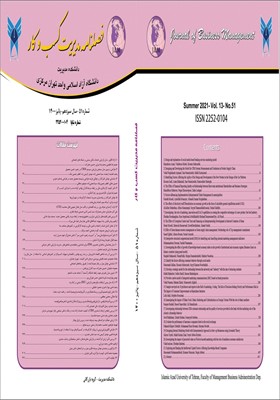بازکاوی و رتبه بندی عوامل سرمایه فکری موثر بر شرکتهای دانش بنیان(مورد مطالعه: شرکت های دانش بنیان خراسان شمالی)
محورهای موضوعی : مدیریت کسب و کارمعصومه محمدآبادی 1 , کیومرث نیازآذری 2 * , نگین جباری 3
1 - گروه علوم تربیتی، واحد گرگان، دانشگاه آزاد اسلامی، گرگان، ایران.
2 - گروه علوم تربیتی، واحد ساری، دانشگاه آزاد اسلامی، ساری، ایران
3 - گروه علوم تربیتی، واحد گرگان، دانشگاه آزاد اسلامی، گرگان، ایران.
کلید واژه: شرکت های دانش بنیان, سرمایه فکری, مولفه های درون سازمانی, مولفه های برون سازمانی,
چکیده مقاله :
هدف این پژوهش بازکاوی و رتبهبندی عوامل سرمایه فکری موثر بر شرکتهای دانشبنیان میباشد. روش توصیفی/پیمایشی با رویکرد کمی است. جامعه آماری مدیران شرکتهای دانشبنیان به تعداد 155نفر میباشند، که با استفاده از روش نمونهگیری تصادفی ساده 110 نفر نمونه انتخاب شدند. ابزار گردآوری دادهها پرسشنامه محقق ساخته می باشد. پایایی پرسشنامه با استفاده از مدل معیار پایایی ترکیبی سنجیده شد که0.89بدست آمد.داده ها با نرم افزارSPSS20 و بسته نرم افزاری SMART-PLS با روش تحلیل عاملی اکتشافی و تاییدی مورد بررسی قرار گرفت. نتایج نشان داد: مولفه های سرمایه فکری موثر بر شرکت های دانش بنیان در دو بعد مولفههای درونسازمانی(ویژگیهای کارآفرین، استراتژی شرکت و ویژگی شرکت) و برونسازمانی(محیط نهادی، محیط سیاسی، محیط فرهنگی/اجتماعی، محیط اقتصادی و محیط زیر ساختی)مطرح میباشند. مدل نهایی پژوهش با شاخصهای برازش تایید شد. مقدار این شاخص 70/0 است که برای مدل طراحی شده نشان از برازش مناسب ساختار عاملی و زیربنای نظری پژوهش میباشد.
This research was conducted with the aim of exploring and ranking the intellectual capital factors affecting knowledge-based companies. The research was performed using a descriptive-survey method with a quantitative approach. The statistical population of this research consisted of 155 directors of knowledge-based companies, from whom 110 people were selected as samples using simple random sampling method. The data gathering tool was a researcher-made questionnaire . Opinions of experts and professors were used to ensure the formal validity of the questionnaire. The reliability of the questionnaire was estimated to be 0.89 using a composite reliability criterion model. Data was analyzed using SPSS20 software and SMART-PLS software package by confirmatory and exploratory factor analysis. The results showed that the intellectual capital components that affect knowledge-based companies can be divided in two groups, internal factors (entrepreneur characteristics, company strategy and characteristics of the company) and external factors (institutional environment, political environment, cultural/social environment, economic environment and the infrastructure environment). The final model of the intellectual capital factors influencing knowledge-based companies was confirmed by fitness indicators with an index value of 0.70 which for the designed model, shows a suitable fitting of the factor structure and the theoretical basis of the research.
_||_

